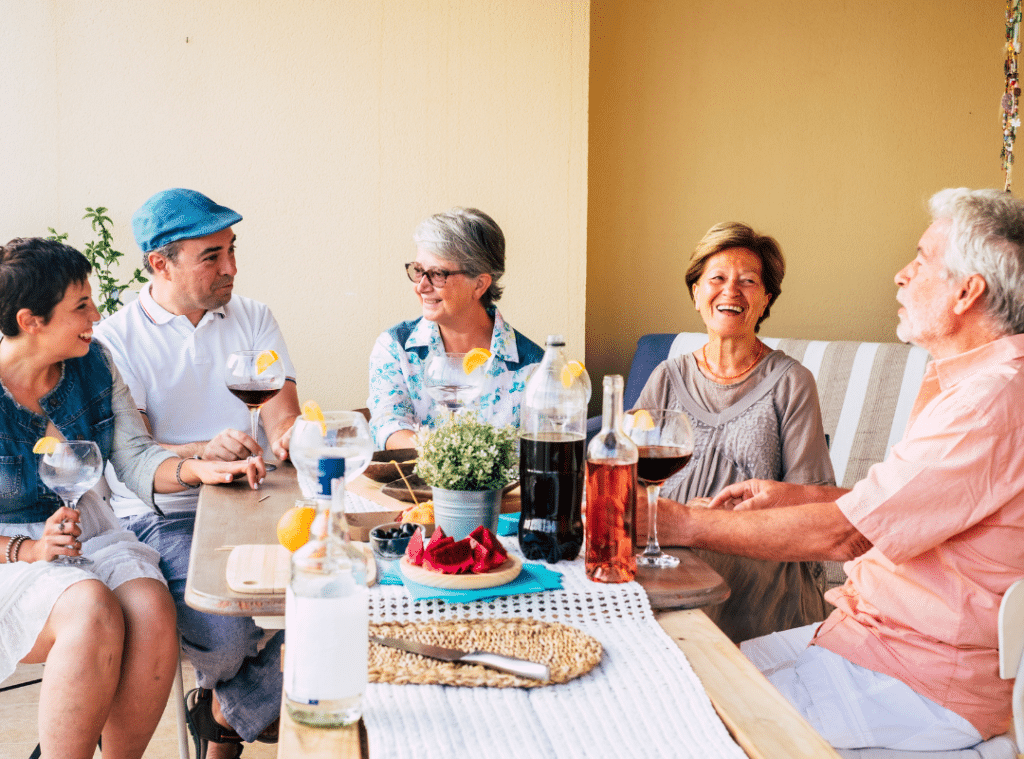Why Are There So Many Sad Old People? Addressing Senior Loneliness
Imagine a 75-year-old man named Frank, who spends his days alone in a quiet apartment, reminiscing about the laughter that once filled his home. Considering Frank’s situation, you might wonder why so many older adults experience similar sadness and isolation. What factors contribute to this loneliness, and how can society, including organizations like Westmont Living, better support these individuals? Understanding the complexities of senior loneliness can pave the way for meaningful conversations and potential solutions that could improve lives.
Understanding Senior Loneliness
Many seniors grapple with loneliness in the wake of significant life changes, a feeling that often seeps into their daily existence. You might encounter sad old people whose experiences mirror one another; their stories reveal a profound sense of isolation after losing long-term partners or friends.
The psychology behind this loneliness can be complex. Emotional connections often dissolve with age, leaving a void that’s difficult to fill.
As you listen to these sad old people’s stories, you may notice common themes of alienation and despair. Many seniors struggle to communicate their emotions, which are shaped by cultural norms that discourage vulnerability. This emotional restraint can exacerbate feelings of loneliness, as they feel unable to share their grief or seek support.
Understanding senior loneliness involves recognizing these emotional struggles and addressing the psychological ramifications. By fostering supportive environments and encouraging open communication, you can help combat the pervasive loneliness affecting many older individuals. Senior companionship alleviates these feelings by providing emotional support and enhancing social connections.
Your efforts to engage with and uplift sad old people can create a ripple effect, nurturing connections that enhance their emotional well-being and a sense of purpose in life.

Causes of Loneliness in Seniors
Loneliness in seniors often stems from a confluence of factors that can be deeply intertwined with their life experiences. As people age, they often face significant losses, particularly the passing of long-term partners, which can leave them feeling isolated.
You might notice that this emotional void contributes to their overall loneliness, making daily tasks like shopping or dining alone challenging.
Social circles tend to shrink over time due to mobility issues, retirement, or even the death of friends, leading to fewer opportunities for meaningful interactions.
Additionally, cultural norms may prevent older adults from expressing their feelings, resulting in a build-up of uncommunicated emotions.
You may come across sad old people pictures that capture this profound loneliness, reminding us of many’s emotional challenges.
The stigma surrounding mental health can also deter seniors from seeking help or sharing their struggles, leaving them trapped in silence. Regular social interaction can help reduce the risks of Alzheimer’s and foster connections for seniors, helping to combat loneliness and improve their overall well-being.
Understanding these causes is vital in providing the necessary support and fostering connections for seniors, helping to combat loneliness and improve their overall well-being.
Emotional Impact of Isolation
Isolation can weigh heavily on older adults, often leading to profound emotional distress that permeates their daily lives. When you’re disconnected from loved ones and the community, feelings of sadness and hopelessness can intensify.
You might find yourself grappling with a sense of emptiness, as the absence of meaningful interactions leaves a void that’s hard to fill.
The emotional impact of isolation manifests in various ways, including:
- Increased Anxiety: The uncertainty of social situations may cause you to withdraw further, compounding feelings of loneliness.
- Loss of Purpose: Without regular engagement, you might struggle to find motivation, leading to a diminished sense of self-worth.
- Heightened Depression: The lack of companionship can exacerbate feelings of sadness, making it difficult to seek help or reach out.
Understanding these emotional consequences is essential. By recognizing the profound effects of isolation, you can advocate for more support and connection opportunities for older adults. Additionally, fostering a supportive community can significantly enhance mental well-being and combat feelings of loneliness.
Together, we can work towards fostering a community where emotional well-being thrives and seniors feel valued and connected.
Coping Strategies for Older Adults
As you navigate the challenges of aging, building social connections and engaging in activities can greatly enhance your well-being. Finding ways to connect with others not only combats loneliness but also fosters a sense of belonging and purpose. Whether it’s joining a local group or picking up a new hobby, these strategies can transform your daily experience and enrich your life. Additionally, participating in community events can provide opportunities for social interaction and a sense of fulfillment.
Building Social Connections
Building social connections can greatly enhance the emotional well-being of older adults. As you look for ways to support seniors in your community, consider these effective strategies to foster connections:
- Join or Create Groups: Encourage older adults to participate in clubs or classes that align with their interests, such as book clubs, gardening groups, or art classes. These environments promote interaction and shared experiences.
- Volunteer Together: Volunteering helps others and builds bonds among participants. Find opportunities for seniors to contribute their skills while connecting with like-minded individuals.
- Utilize Technology: Teach seniors how to use social media or video calling to stay in touch with family and friends. This can bridge the gap when in-person visits aren’t possible, keeping their social circle active.
Engaging in Activities
Engaging in activities can greatly uplift the spirits of older adults, providing both mental stimulation and a sense of purpose. When you participate in hobbies, join clubs, or volunteer, you keep your mind active and create opportunities to connect with others. This sense of community is vital for combating loneliness.
Consider exploring new interests or rekindling old ones. Painting, gardening, or participating in a book club can foster creativity and contribute to overall well-being.
Volunteering is particularly impactful; it allows you to give back while forming bonds with like-minded individuals.
Moreover, physical activities like walking or group exercises can enhance both mental and physical health. They promote social interaction while improving mood and energy levels.
It’s important to acknowledge that every small effort counts. Start with one activity that excites you, and gradually expand your engagement.

Community Support and Resources
Community support is essential in alleviating loneliness among older adults, with numerous organizations and initiatives designed to foster connections and provide resources.
By actively participating in community programs, you can help create a more inclusive environment for seniors. Here are some key resources to take into account:
- Local Senior Centers: These often host social events, educational workshops, and fitness classes, offering a chance to meet peers and build friendships.
- Volunteer Programs: Volunteering supports the community and provides older adults with a sense of purpose and belonging.
- Support Groups: These groups allow seniors to share experiences and feelings, fostering emotional connections and reducing isolation.

The Role of Mental Health
Mental health plays a vital role in the lives of seniors, with depression often lurking beneath the surface.
Emotional expression becomes more challenging as societal norms discourage open communication, leaving many to suffer in silence.
Understanding these dynamics is essential to addressing the loneliness that many older adults experience.
Depression Among Seniors
Loneliness often casts a long shadow over the lives of seniors, making the risk of depression more pronounced in this population. As you engage with older adults, it’s essential to recognize that depression isn’t a normal part of aging; rather, it stems from various factors. Understanding these can help you provide better support.
Consider these common aspects of depression among seniors:
- Social Isolation: Many seniors face loneliness due to the loss of friends or family, which can exacerbate feelings of sadness.
- Health Issues: Chronic pain or cognitive decline can trigger or worsen depressive symptoms, making daily activities feel overwhelming.
- Loss of Purpose: Retirement or the death of a partner can leave seniors feeling unmoored, leading to identity loss and depression.
Awareness of these factors can help you approach the situation with empathy and understanding. Encourage open conversations about feelings and suggest resources for support.
Emotional Expression Challenges
Understanding the emotional expression challenges faced by older adults is essential in addressing their mental health needs. Many older individuals struggle to express their feelings due to a lifetime of cultural norms discouraging open emotional communication.
You might notice that this “stiff upper lip” mentality often leaves them feeling isolated and misunderstood.
When loss occurs—be it a spouse, friend, or even a role in society—older adults may find it difficult to articulate their grief and loneliness. Instead of sharing their pain, they often internalize it, leading to deeper emotional struggles.
This difficulty in expressing emotions not only exacerbates feelings of sadness but can also complicate relationships with family and friends who might want to help but feel shut out.
Creating environments where older adults feel safe sharing their emotions is vital. Encouraging open dialogues and offering platforms for expression can significantly improve their mental health.
In the tapestry of life, the threads of companionship often fray with age, leaving many older adults feeling adrift. At Westmont Living, we recognize the roots of their loneliness and strive to foster community connections to weave a stronger support fabric. Encouraging open conversations about emotional struggles is vital, as this can illuminate the path toward healing. By reaching out to us at 858-456-1233, together, we can help seniors rediscover their purpose and joy, transforming solitude into a symphony of shared experiences and vibrant connections.
Dive into the vibrant life our Westmont communities have to offer.Find Where You Belong
Frequently Asked Questions
What to expect when you’re 75 years old?
At 75, you may experience changes in physical health, energy levels, and cognitive function, which vary widely among individuals. Many people find new opportunities to focus on hobbies, relationships, and personal growth, while others manage chronic health conditions or mobility challenges. Staying active, maintaining social connections, and regular health check-ups can greatly enhance your quality of life.
Why am I struggling with getting older?
Struggling with aging can stem from physical changes, fears about independence, or societal perceptions of aging. Emotional challenges like grief, nostalgia, or adapting to new routines are also common. Seeking support from friends, family, or counselors and focusing on purpose and positivity can help you navigate these transitions.
How to care for old age people?
Caring for older adults involves providing emotional support, meeting their physical needs, and promoting their independence. Engage them in meaningful activities, help manage medical care, and create a safe and comfortable environment. Communication and patience are key to understanding and addressing their unique needs.
How to help older people who are lonely?
You can support lonely older adults by visiting them regularly, encouraging them to join social groups, or introducing them to technology to stay connected with family and friends. Small gestures like regular phone calls, writing letters, or accompanying them to community events can make a big difference. Encouraging hobbies or volunteering opportunities can also help them feel purposeful and connected.









